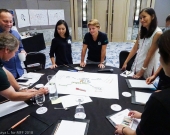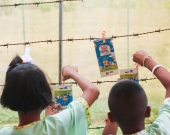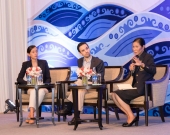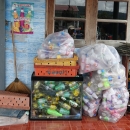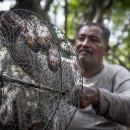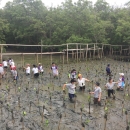Topics :: Private Sector :: Private Sector Engagement
Private Sector Engagement
The coastal zones of Asia, home to some of the world’s most productive natural habitats, are thriving hubs of economic activity. They contribute to over 40% of the world’s fisheries production and are important centres of tourism. Although this development brings benefits to many, increasing pressures from overfishing, unplanned development, pollution and climate change are putting the health of coastal ecosystems, and the communities that depend on them, at risk.
Intact and healthy coastal ecosystems are valuable not only because of their natural beauty, but also because they provide food and nutrition, livelihoods, protection against storm surges and other essential goods and services to people. For business, degrading ecosystems present a number of significant risks including: disruptions to operations, reduced production capacity, increased competition for resources, and increased levels of public scrutiny and government regulation. As a result, companies in key sectors such as fisheries and aquaculture, coastal tourism, shipping and coastal mining, increasingly understand that a focus on sustainability should be a core part of their business thinking, and will be critical to their long-term success.
Mangroves for the Future (MFF) is working to actively harness the resources, creativity, and entrepreneurial spirit of the private sector to protect coastal ecosystems. This involves activities such as:
- Helping key industries assess and mitigate their impacts;
- Influencing supply chains and helping companies source sustainable products;
- Encouraging sustainable private sector development at a community level;
- Supporting connections to local communities and optimizing return on CSR investment;
- Exploring new green products and services which can benefit coastal communities; and
- Changing standards of business practices.
Many businesses, large and small, are already reaping the benefits of strategic investments in coastal sustainability. In Viet Nam, MFF has worked with major seafood export companies to support shrimp farming models which maintain forest cover around shrimp ponds. These have led to reduced crop risk failure, which means seafood companies now have access to reliable supplies of shrimp that can be certified organic. MFF Thailand has worked with Marriott Hotels and Resorts in a national partnership that works to restore mangrove forests and support communities by giving preference to sustainable seafood and local products.
MFF also uses small grant mechanisms to support small community enterprises such as fish drying and seaweed cultivation. These help provide alternative livelihoods and increase the income of households whose livelihoods have been affected by degrading coastal ecosystems.
There are many ways in which MFF and private sector can work together. Currently, there is a Small Grant Facility for Private Sector Engagement and for private sector entities who want to implement small projects in MFF countries, MFF will match cash funding from the private sector up to a maximum of USD 25,000.
To find out how your company can be a part of this initiative, contact:
Steen ChristensenCoordinator, Mangroves for the Future
63 Sukhumvit Soi 39
Bangkok 10110 Thailand
Tel: +6626624029 ext 122
Email: steen.christensen@iucn.org
Related News
International Year of the Reef: Joining forces to fight for the health of our oceans
Phuket, Thailand 25 Jul 2018
Country: Thailand
Topic: Capacity Building, Coastal Governance, Economic Valuation ...
“Collaboration,” “Education” and “Innovation” are three words that summed up a workshop on 20 July aimed at promoting best practices in coastal and marine conservation among the private sector.
Closing the 'plastic loop' on marine waste across Asia
Bangkok, Thailand 06 Jun 2018
Country: Global, Asia Region
Topic: Capacity Building, Civil Society Engagement, Climate change ...
In a special World Environment Day op-ed, Aban Marker Kabraji, Regional Director for IUCN Asia and Director of IUCN's Regional Hub for Asia-Oceania, writes about grassroots initiatives and efforts to engage the private sector that IUCN and Mangroves ...
Regional conference sheds light on pressing marine environmental issues in Asia
Bangkok, Thailand 04 Feb 2018
Country: Asia Region
Topic: Marine Protected Areas, Capacity development, Community Resilence ...
Featured Projects
Keeping the sand in "Sun, Sea and Sand": Helping coastal communities monitor, understand and manage beach movement and erosion in Seychelles
Duration:
Location: Several beaches on the island of Mahe, but one example, Anse Intendance beach, Mahe
Topics: Knowledge for Management , Capacity Building , Private sector partnerships

Coastal development and ecosystem modelling as a tool to enable improved local and national policy and decision-making processes
Duration: 24 months
Location: Beau Vallon Baie, Mahe; Anse Intendance, Mahe; North Island; Denis Island
Topics: Knowledge for Management , Economic Valuation , Civil Society Engagement , Integrated Coastal Planning , Management Assessment and Monitoring , Private sector partnerships , Knowledge management and communications

Cooperative women producing and selling souvenirs as an additional livelihood to reduce mangrove overexploitation in Giao Xuan Commune – the buffer zone of Xuan Thuy National Park, Nam Dinh
Duration: 12 months
Location: Giao Xuan Commune is located in the buffer zone of Xuan Thuy National Park, Giao Thuy District, Nam Dinh Province
Topics: Civil Society Engagement , Capacity Building , Sustainable Livelihoods , Community Resilence , Sustainable Business Practices , Gender equality , Private sector partnerships
Featured Film - Reaping from investing in coastal ecosystems
Reaping from investing in coastal ecosystems, Jeju, Republic of South Korea © IUCN
Donald Macintosh, Senior Advisor, Mangroves for the Future Programme talks about how investing in coastal ecosystem like the mangroves is a win-win situation for everyone as it gives a massive boost to the ecology and the economy while protecting us from natural disasters like the tsunami.
Related Events
MFF Phase 3 Regional Completion Workshop
Bangkok, Thailand 17 Dec 2018
MFF Phase 3 National Completion Workshops
Each MFF country 01 Nov 2018
13th Regional Steering Committee Meeting
Cox's Bazar, Bangladesh 25 Oct 2016
Related Images
Related Publications

Coastal Resilience in Action - Achievements and Lessons Learned from Mangroves for the Future in Pakistan 2014-2018
Author: Zaigham Khan / MFF Pakistan
Publisher: MFF Pakistan
Posted on: 15th Feb 2019
Category: SGF (Small Grant Facility)
Size: 4.5 MB
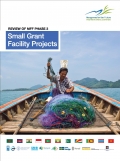
Review of MFF Phase 3 Small Grant Facility Projects
Author: Tom Blomley in collaboration with Mangrove for the Furture
Publisher: Mangroves for the Future, Bangkok, Thailand
Posted on: 12th Feb 2019
Category: SGF (Small Grant Facility)
Size: 5.7 MB
